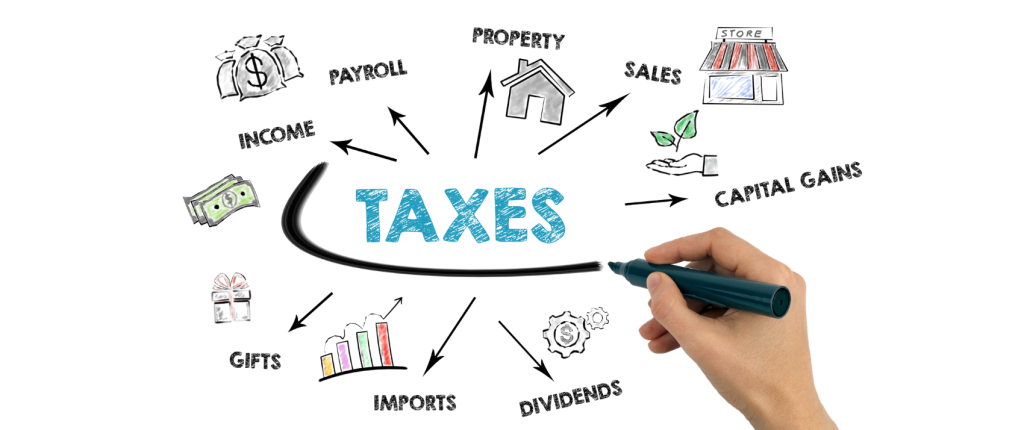Did you know that failing to comply with tax regulations can result in fines up to 200% of the owed amount? Welcome to the complex world of business taxes—an essential yet often daunting aspect of entrepreneurship.
Table of Contents

Understanding Business Taxes in South Africa
Taxes are an unavoidable part of running a business, and understanding them is crucial for compliance and financial health. In South Africa, businesses are subject to several types of taxes, each with its specific regulations and deadlines. This guide aims to demystify business taxes, providing you with the knowledge to navigate the 2024 tax season confidently.
1. Corporate Income Tax
Corporate Income Tax (CIT) is a tax imposed on the taxable income of companies. As of 2024, the standard CIT rate in South Africa is 28%. However, small businesses benefit from a graduated tax rate. For small business corporations (SBCs) with an annual turnover not exceeding ZAR 20 million, the tax rates are more favourable:
- 0% on the first ZAR 95,750
- 7% on taxable income above ZAR 95,750 but not exceeding ZAR 365,000
- 21% on taxable income above ZAR 365,000 but not exceeding ZAR 550,000
- 28% on taxable income exceeding ZAR 550,000
When to Pay Corporate Income Tax:
CIT is payable in two provisional tax payments during the year, based on estimated income. The first payment is due six months into the financial year, and the second payment at year-end. A final payment, if necessary, is made upon assessment by the South African Revenue Service (SARS).
How to Pay Corporate Income Tax:
Payments can be made via SARS eFiling, a convenient online platform where businesses can file returns and make payments.
2. Value-Added Tax (VAT)
VAT is an indirect tax levied on the consumption of goods and services. The standard VAT rate in South Africa is 15%. Businesses that supply goods or services exceeding ZAR 1 million per annum must register for VAT.
When to Pay Value-Added Tax (VAT):
VAT returns are generally submitted bi-monthly. However, businesses with a turnover exceeding ZAR 30 million per annum must submit returns monthly. Smaller businesses with a turnover of less than ZAR 1.5 million can opt for a six-monthly VAT period.
How to Pay Value-Added Tax (VAT):
VAT payments are made through SARS eFiling or direct bank transfers. Accurate record-keeping of all sales and purchases is essential for determining VAT liabilities.
3. Pay-As-You-Earn (PAYE)
PAYE is a system where employers deduct tax from employees’ wages and salaries. This tax is paid to SARS on behalf of the employees.
When to Pay Pay-As-You-Earn (PAYE):
PAYE must be paid monthly. Employers are required to submit monthly employer declarations (EMP201) and make payments to SARS by the seventh day of the following month.
How to Pay Pay-As-You-Earn (PAYE):
Employers can use SARS eFiling for submitting EMP201 declarations and making PAYE payments.
Navigating the 2024 Tax Season

The 2024 tax season comes with its own set of updates and changes that businesses need to be aware of. Staying informed and compliant can save you from potential penalties and ensure smooth operations.
Tax Compliance and Penalties
Tax compliance is not just about paying taxes on time but also about accurate reporting. Businesses must maintain detailed records of all financial transactions, including sales, purchases, expenses, and payroll. Non-compliance can result in severe penalties, including:
- Administrative penalties for late submissions
- Understatement penalties for incorrect declarations
- Interest on late payments
Tax-Saving Strategies for Businesses
Understanding how to optimise your tax liabilities can significantly impact your bottom line. Here are some effective strategies to help you save on taxes and improve your financial health.

1. Utilising Tax Deductions
Tax deductions are specific expenses that you can subtract from your gross income to reduce your taxable income. Common deductions for businesses in South Africa include:
- Operating Expenses: These are the day-to-day costs of running your business, such as rent, utilities, and office supplies.
- Capital Allowances: Depreciation on capital assets like machinery, equipment, and buildings can be deducted over several years.
- Employee Costs: Salaries, wages, and other employee benefits can be deducted. Additionally, contributions to employee retirement funds are also deductible.
- Research and Development (R&D): Businesses involved in innovative projects can claim deductions on R&D expenses. This is particularly beneficial for tech and pharmaceutical companies.
2. Small Business Corporation (SBC) Relief
If your business qualifies as a Small Business Corporation (SBC), you can benefit from lower tax rates and additional deductions. To qualify, your business must meet specific criteria, including:
- Annual turnover not exceeding ZAR 20 million
- Shareholders must be natural persons and not hold shares in any other private company
- Less than 20% of your income should come from investments or rendering a personal service
3. Tax Incentives
The South African government offers several tax incentives to promote business growth and investment:
- Employment Tax Incentive (ETI): This incentive encourages businesses to hire young workers by reducing the amount of PAYE payable.
- Urban Development Zone (UDZ) Allowance: Businesses that invest in certain urban development zones can claim additional allowances on their property investments.
- Special Economic Zones (SEZ) Tax Relief: Businesses operating in designated SEZs can benefit from a reduced corporate tax rate of 15%, accelerated depreciation, and VAT and customs relief.
Best Practices for Managing Business Taxes
Efficient tax management is about more than just saving money; it’s about creating a sustainable financial strategy. Here are some best practices to help you manage your business taxes effectively:

1. Maintain Accurate Records
Keeping detailed and accurate records of all financial transactions is crucial. This includes invoices, receipts, bank statements, and payroll records. Good record-keeping not only ensures compliance but also makes it easier to identify deductible expenses and prepare accurate tax returns.
2. Plan for Tax Payments
Tax liabilities can be a significant financial burden if not planned for adequately. Establish a tax reserve account and set aside funds regularly to cover your tax obligations. This proactive approach helps prevent cash flow issues when tax payments are due.
3. Use Professional Tax Services
Navigating the complex world of business taxes can be challenging without expert help. Consider hiring a professional tax advisor or accountant to assist with tax planning, compliance, and filing. Their expertise can help you identify tax-saving opportunities and ensure that you meet all regulatory requirements.
4. Leverage Technology
Modern accounting software and tax management tools can simplify the tax process. These tools can automate calculations, generate reports, and even integrate with SARS eFiling for seamless tax submissions. Investing in the right technology can save time, reduce errors, and provide valuable insights into your financial health.
The Importance of Tax Compliance

Compliance with tax regulations is not only a legal requirement but also a crucial aspect of good business practice. Non-compliance can result in severe penalties, damage your reputation, and disrupt your operations. Staying informed about tax laws and changes, such as those for the 2024 tax season, ensures that you remain compliant and avoid unnecessary complications.
Tax Updates and Trends for 2024
As we progress through 2024, several key updates and trends in the tax landscape are crucial for businesses to understand. Keeping abreast of these changes will ensure that your business remains compliant and takes full advantage of available benefits.
1. Digital Taxation
With the rapid growth of the digital economy, South Africa has introduced measures to tax digital transactions more effectively. This includes the taxation of income derived from digital services and e-commerce activities. Businesses involved in digital trade should ensure they understand these regulations and incorporate them into their tax planning strategies.
2. Environmental Taxes
Environmental sustainability is becoming a focal point in global and local policy. In line with this, South Africa has introduced carbon taxes and other environmental levies to promote greener practices. Businesses can reduce their tax burden by investing in sustainable technologies and practices that qualify for environmental tax incentives.
3. Transfer Pricing Adjustments
For multinational companies, transfer pricing remains a critical issue. South Africa continues to refine its transfer pricing regulations to prevent profit shifting and ensure fair taxation. Businesses engaged in cross-border transactions must adhere to these rules and prepare comprehensive documentation to support their transfer pricing policies.
Future-Proofing Your Business
As the tax landscape evolves, continuous learning and adaptation are key. Engaging with professional training and staying informed about tax law changes will empower you to make informed decisions and maintain compliance. Regenesys School of Finance offers courses that are specifically designed to provide business leaders with the knowledge and skills needed to excel in tax management and financial planning.

Our Finance programmes are crafted to deliver in-depth knowledge and practical skills that are immediately applicable to your business. By enrolling in our courses, you gain access to expert faculty, comprehensive resources, and a community of like-minded professionals committed to excellence in finance and business management. Our courses cover everything from basic tax principles to advanced tax planning strategies, ensuring you stay ahead of the curve.
We understand the importance of continuous learning and professional development. By investing in education, you can stay ahead of tax regulations, optimise your tax liabilities, and drive your business towards sustainable growth.
Final Thoughts
Taxes are an integral part of running a business, and managing them effectively can lead to significant financial benefits. By staying informed, utilising available resources, and investing in continuous education, you can navigate the complexities of the tax system with confidence and drive your business towards sustained growth and success.

Thank you for engaging with our comprehensive guide on business taxes. We hope this article has provided you with the insights and motivation needed to tackle your tax responsibilities head-on. For more in-depth learning and professional development, explore the courses offered by the Regenesys School of Finance and take the next step in empowering your business.






